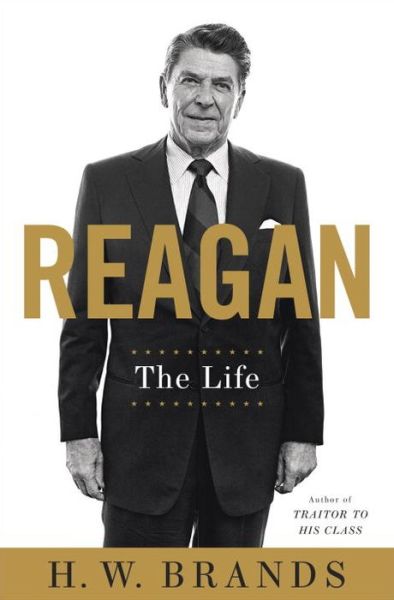REAGAN: THE LIFE
By H.W. Brands
Doubleday, $35, 816 pages
Several years ago, I attended an average lecture by an average left-wing college professor about his average book about the anything-but-average George Washington.
At the event following the lecture, the average college professor’s spouse informed me that she was glad he’d written a new book because now it would be added to the syllabi of all their friends and associates around the country. I asked her to elaborate. She told me they’d become very comfortable over the years because each time he wrote a book, while it may have been a failure commercially, it didn’t matter because dozens of college professors mandated that tens of thousands of students had to purchase the book, guaranteeing the average college professor tens of thousands of dollars in royalties.
Collectivism? You bet.
Perhaps this was part of the motivation for H.W. Brands’ new but very average book on Ronald Reagan. College professors are good at giving awards and getting awards and lecturing from their ivory towers, but often they are not very good at writing history.
Mr. Brands is a run-of-the-mill liberal college professor who appears to never venture forth from the academy to actually witness or report on history. The writing itself is mostly fine, though he doesn’t go very far in his research.
Also, the problem with his book is not just that there are glaring gaps (more on this later) but also because he breaks no new ground in writing about the Gipper. The greatest of all the Reagan biographers, Lou Cannon, watched and observed and covered Reagan for 50 years. Mr. Cannon is still discovering and writing new facts about Reagan.
Others such as Arthur Schlesinger were also eyewitnesses to history.
David McCullough and Robert Caro marinate themselves in their subjects. Mr. Caro once slept on the ground of the Hill Country just to gain a better perspective on Lyndon Johnson. Mr. McCullough has traveled the world in search of elusive new facts.
Moreover, Mr. Brands relies heavily on Edmund Morris and his widely discredited book, “Dutch.” Fortunately, he also heavily relies on the superb “Reagan Diaries” edited by the estimable Doug Brinkley. There are also large holes in the Brands storyline. For instance, he spends only a few pages on the 1976 campaign. As anyone will tell you, ifReagan hadn’t made this race, he never would have run in 1980. Mr. Brands also completely overlooks the importance of 1977 to 1979, foundational years for the Gipper. (I am now writing a book on this important time.)
Mr. Brands did not use National Review, The American Spectator, Human Events or The Washington Times for research, and as the most pedestrian Reagan biographer will tell you, these publications were vitally important to the life and times of Ronald Reagan. His research relies on a narrow band of books and even narrower band of interviewees. The scholarship is thin, to say the least. He also says that Marty Anderson played a “less central” role in the life and times of Ronald Reagan, which is a profoundly wrong statement.
Mr. Brands is also is mistaken when he writes that Richard Nixon’s resignation cleared the path for Reagan. It did not. Reagan would have had a much easier time running for the nomination with a wounded Nixon still in office than facing Gerald Ford, who made much of the fact that he wasn’t a part of Watergate.
The author also oddly thanks Gary Sick. Mr. Sick is the weirdo who fashioned the totally fictitious account that had George Bush flying to Europe to meet personally with Ayatollah Ruhollah Khomeini to pressure him into keeping the hostages in Tehran in the summer of 1980. Yeah, right. Only candidates for an institution like Michael Moore believe in that version of the “October Surprise.”
And yet there is scant mention of Dick Schweiker, Paul Laxalt, John Sears and others who loomed large in the Reagan narrative, such as Peter Hannaford, David Keene or Frank Donatelli. He certainly never interviewed them or dozens of others who could have elaborated on the Reagan story. Mr. Brands also employs the annoying habit of almost never crediting another author from where his information is coming, as if Mr. Brands newly reports it. He rarely says, “As Lou Cannon recounted ” or “As Mike Deaver told .”
There is also too much restating of the obvious: “Weinberger became Reagan’s point man for the Pentagon buildup.” Everybody in Western Civilization knew this about Cap.
By this point, most know the basic Reagan story, from Tampico to Washington, and most Reagan scholars are now into deeper studies of the Gipper, new information and more nuanced analysis. This was a deep and thoughtful man who deserves deep and thoughtful scholarship.
Mr. Brands nonsensically writes that Reagan entered politics because he “wanted attention.” Reagan entered politics because he wanted to get things done.
• Craig Shirley, president of Shirley & Banister Public Affairs, has written two books about Ronald Reagan and is the author of “December 1941” (Thomas Nelson). He is also the author of “Last Act: The Final Years and Emerging Legacy of Ronald Reagan,” due out in October from Harper Christian.

No comments:
Post a Comment